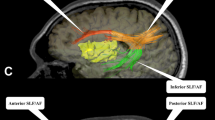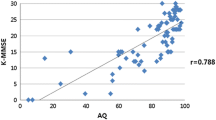Abstract
Purpose
Language dysfunction is a crucial deficit in terms of cognitive functioning, quality of life and activities of daily living. Several studies have identified cognitive impairment in patients with cancer across several cognitive domains, including language.
Methods
We investigated language functions among 182 patients with different types of cancer (not brain cancer) and compared them with the performance of Greek healthy adults with the same age and educational levels as the patients. The assessment included verbal fluency test, both semantic (animals) and phonological (X), and Boston Naming Test (BNT-60) among other neuropsychological measures.
Results
Breast cancer patients performed worse compared to patients with prostate, colorectal and thyroid cancer in language tasks. In addition, breast cancer patients had a decreased performance compared with healthy adults, while patients with other types performed to the mean in two out of three language tasks.
Conclusions
Semantic and phonological fluency requirements of cognitive processes in the brain are discussed.
Implications for cancer survivors
Language dysfunction is a crucial deficit in terms of cognitive functioning, quality of life and activities of daily living, especially in brain cancer patients, but it can be crucial for patients with other types of cancer as stated in the present study.

Similar content being viewed by others
Notes
ET—endocrine therapy which includes tamoxifen and aromatase inhibitors.
References
Megari K (2013) Quality of life in chronic disease patients. Health Psychol Res 1:141–148
Noggle CA, Dean RS (2013) Neuropsychology of cancer and oncology. Springer Publishing Company, New York
Pendergrass JC, Targum SD, Harrison JE (2018) Cognitive impairment associated with cancer. a brief review. Innov Clin Neurosci 15:36–44
Van Dam FS, Boogerd W, Schagen SB, Muller MJ, Fortuyn M, Wall E, Rodenhuis S (1998) Impairment of cognitive function in women receiving adjuvant treatment for high-risk breast cancer: high-dose versus standard-dose chemotherapy. J Natl Cancer Inst 90:210–218
Von Ah D, Habermann B, Carpenter JS, Schneider BL (2013) Impact of perceived cognitive impairment in breast cancer survivors. Eur J Oncol Nurs 17:236–241
Sequeira AZ, Krishnamurthy K (2014) Study of cognitive functions in breast cancer patients: a case control study. J Med Sci Res 5:129–133
Megari K (2020) Neuropsychological functioning among patients with different types of cancer. Postchemotherapy cognitive impairment and implications for rehabilitation. Neuropsychiatrie (in press). https://doi.org/10.1007/s40211-020-00345-x
Kosmidis ME, Vlahou C, Panagiotaki P, Kioseoglou G (2004) The verbal fluency task in the Greek polulation: normative data, and clustering and switching strategies. J Int Neuropsychol Soc 10:164–172
Patricacou A, Psallida E, Pring T, Dipper L (2007) The boston naming test in Greek: normative data and the effects of age and education on naming. Aphasiology 21:1157–1170
Shao Z, Janse E, Visser K, Meyer AS (2014) What do verbal fluency tasks measure? Predictors of verbal fluency performance in older adults. Front Psychol 5:1–10
Pereira JB, Junque C, Marti MJ, Ramirez-Ruiz B, Bartres-Faz D, Tolosa E (2009) Structural brain correlates of verbal fluency in Parkinson’s disease. NeuroReport 20:741–747
Friederici AD (2011) The brain basis of language processing: from structure to function. Physiol Rev 91:1357–1392
Acknowledgements
The author declares that she has not received financial support for the present study. I would like to thank all patients for taking part in the present study.
Author information
Authors and Affiliations
Corresponding author
Ethics declarations
Conflict of interest
The author declares that she has no competing financial interests or personal relationships that could have appeared to influence the work reported in this paper.
Ethical statement
Participants were treated in accordance with the Declaration of Helsinki pertaining to research with human subjects. The study received no financial support and none of the authors has any conflicts of interest to report.
Additional information
Publisher's Note
Springer Nature remains neutral with regard to jurisdictional claims in published maps and institutional affiliations.
Rights and permissions
About this article
Cite this article
Megari, K. Language impairment among patients with different types of cancer. Comparison with healthy adults. Breast Cancer Res Treat 184, 779–782 (2020). https://doi.org/10.1007/s10549-020-05898-7
Received:
Accepted:
Published:
Issue Date:
DOI: https://doi.org/10.1007/s10549-020-05898-7




